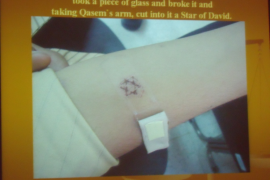On June 15th, we posted about a Guardian report co-authored by Peter Beaumont which included a gratuitous (and erroneous) characterization to the three Israeli teens abducted by Palestinian terrorists on Thursday night as “teenage settlers”. (As we noted in a subsequent post, the Guardian amended the article following our complaint.)
Today, we’re reviewing the coverage of the abduction by the Guardian and other major UK news sites (The Telegraph, Independent, Times of London, and Financial Times), to determine if other reports include tendentious, biased reporting or misleading claims.
The Guardian:
The first report on the incident was written by Peter Beaumont and Paul Lewis on Friday, June 13, was titled ‘Israelis launch search around Hebron after three teenage settlers go missing‘, and (as we noted) falsely claimed, in the headline and subsequent text, that the abducted teens were all “settlers”.

The second report by Beaumont was published in the Observer (sister publication of the Guardian) on June 14th, was titled ‘Fears grow for missing Israeli teenagers‘ and also included the false claim that the three were ‘settlers’. (The Guardian has not thus far revised this passage.)
A third report, Guardian/Associated Press, was published on June 14th and titled ‘Israeli raids target Hamas members as Netanyahu accuses group of kidnapping‘. Unlike the previous two reports, it didn’t characterize the teens as settlers, and included no other misleading claims.
A fourth report was published by Beaumont on June 15th titled ‘Israeli forces tighten grip on West Bank in search for three abducted teenagers‘. This report also didn’t falsely characterize the teens as settlers, and included nothing similarly problematic.
A fifth report was published by Beaumont (and Agencies) on June 15th titled ‘Israel detains scores in West Bank as fears grow for missing teenagers‘, and included nothing problematic. However, they used the following still shot – a deceptive photo illustrating the IDF’s search for the abducted teens, in an angle in which the soldier’s rifle appears to be pointing directly at Palestinian civilians – accompanying a brief video.

A sixth report was filed by Beaumont (and Agencies) on June 16th titled ‘Palestinian parliamentary speaker arrested in search for kidnapped teens‘. And, a seventh report by Beaumont was published on the same day titled ‘Israel considering expelling Hamas leaders from West Bank to Gaza‘. Neither of these articles included any especially problematic material.
The Independent
The first Indy report on the abduction was written by Ben Lynfield on June 15th, was titled ‘Israel lays blame for abduction of teenagers on Fatah-Hamas pact‘, and was largely fair, but did include the same highly inappropriate photo that the Guardian used.

A second report (as we noted in our previous post on June 15th) in the Indy, written by Jack Simpson, was titled ‘Netanyahu accuses Hamas of kidnapping Israel’s three missing boys‘ and included the false suggestion that all three teens lived in settlements. (Indy editors corrected the relevant passage shortly after our complaint.) A third report in the Indy, by Lizzie Dearden, on June 16th, titled ‘Facebook campaign calls on Israelis to kill a Palestinian ‘terrorist’ every hour until missing teenagers found‘, focused on a marginal Israeli Facebook group while of course ignoring reports that the official Facebook page of Fatah openly celebrated the terrorist kidnapping.
A fourth report in the Indy, by Ben Lynfield, on June 17th, titled ‘Israeli search for kidnapped youths turns into push against Hamas‘, actually included a photo of the three teens, and – as we note below in our summary – also stood out by reporting on the “60 attempts to carry out abductions in the past 12 months” by Palestinian terrorists. (As we note in our summary, such vital context was also non-existent in the UK media’s reporting on the incident.)
Times of London
A Times report by David Rankin on June 14th, titled ‘Search continues for three teens feared kidnapped in Israel‘, and a second report by Tony Bonnici on June 15th, titled ‘Israel PM says teenagers ‘kidnapped by terror group‘, are both unproblematic. A June 16th report at the Times by Joshua Mitnick titled ‘Hamas leaders held in Israeli hunt for kidnapped teenagers‘ was unusual in respect to the fact that Mitnick quoted the parents of Eyal Yifrach, one of the kidnapped boys, who addressed the media on Monday with ‘an emotional address to their son’. (As we note in our summary, the UK media mostly ignored the families of the kidnapped teens.)
The Telegraph
The Telegraph published a report on June 15th by their Jerusalem correspondent Robert Tait titled ‘Hamas to blame for youths’ “kidnapping”, Benjamin Netanyahu says‘, and was unproblematic, save a curious use of quotes around the word “kidnapping” in the headline. (Note: even the Guardian refers to the incident as a kidnapping, without the use of quotes.) And, on the same day, the Telegraph published a story (attributed partially to Reuters) titled ‘Israel’s Prime Minister Benjamin Netanyahu claims Hamas militants behind teenagers’ abduction‘ which included a video of Prime Minister Netanyahu’s press conference that day.
The third article (Reuters) published at the Telegraph on June 16th, titled ‘Hamas kidnapping: Israel expands West Bank hunt for Palestinian teenagers as Palestinian killed‘, is illustrated with an unrelated and highly inappropriate photo depicting the aftermath of an Israeli strike in Gaza. Additionally, the caption failed to explain that the IDF strike came in response to the firing of Grad rockets at Ashkelon the previous day.

However, almost as if to make up for the misleading and inappropriate Gaza photo, the story also included a photo of the abducted teens to illustrate the story.
 Later the same day, the Telegraph published their fourth report, by Robert Tait, titled ‘The bus stop that voices Israel’s anguish over missing teenagers‘, which, for the second time in their coverage of the kidnapping to date, used a photo which evokes sympathy for the missing teens.
Later the same day, the Telegraph published their fourth report, by Robert Tait, titled ‘The bus stop that voices Israel’s anguish over missing teenagers‘, which, for the second time in their coverage of the kidnapping to date, used a photo which evokes sympathy for the missing teens.

The report explained:
At first sight, it appears to be just an isolated, lonely bus shelter.
But the yellow ribbons and defiant messages bedecking it eloquently attested to how it has become a symbol of Israel’s anguish over three missing teenagers.
“We will bring you back” and “The people of Israel are alive” read Hebrew messages on large posters beside smaller leaflets bearing the English inscription “# bring our boys homes”
The report also included a photo of the three teens.
Financial Times
On June 15th the Financial Times published a report by John Reed, titled ‘Netanyahu accuses Hamas over kidnapping of Israeli teenagers‘, which opened with this curious passage:
Benjamin Netanyahu, Israel’s prime minister, on Sunday blamed the Palestinian militant group Hamas for the kidnapping of three Israeli teenagers, raising the stakes in a missing-person case that has transfixed the country and its leaders.
Though Reed’s obfuscatory language isn’t quite as egregious as the New York Times recent conflation of cause and effect, as revealed by CAMERA’s Tamar Sternthal, it is still troubling that the passage nonetheless suggests that the prime minister ‘raised the stakes’ in the kidnapping (what’s characterized as a “missing person case”) when he blamed Hamas for the abduction.
Reed also makes a gratuitous reference to “radical Jewish settlers” in Hebron, who he claims represent the cause of “tensions between Israelis and Palestinians”, without noting the extremely destabilizing presence of a large number of Hamas terrorists in the city.
Summary:
- The Guardian has published the greatest number of stories on the kidnapping to date, filing seven out of the nineteen total reports covered in this review.
- With the exception of two reports in the Telegraph, and one in the Independent, every photo used to illustrate the teens’ abduction by terrorists focused on the Israeli military response to the incident, rather than on the boys, their families or reactions by the Israeli public. In contrast, as we’ve noted in previous posts, the UK media almost uniformly focused on the families of Palestinian terrorists released over the past year by Israeli authorities, rather than on the families of the Israeli victims.
- With the exception of Robert Tait’s story on June 16th and a report the same day by Peter Beaumont in the Guardian, no other UK media outlet quoted a family member of one of the teenage victims. Alternately, several reports quoted Palestinians in the West Bank condemning the IDF’s military response to the terrorist abduction.
- Only one report, in the Indy, provided context on the high number of thwarted kidnapping attempts by Palestinian terror groups over the last year. However, the Guardian’s Peter Beaumont did cite three specific examples of previous kidnappings – one in 2001, one in 2011 and another in 2013.
- None of the articles mentioned the enthusiastic support by some Palestinians – including by journalists working for the state-run Palestinian media – for the terrorist kidnapping





